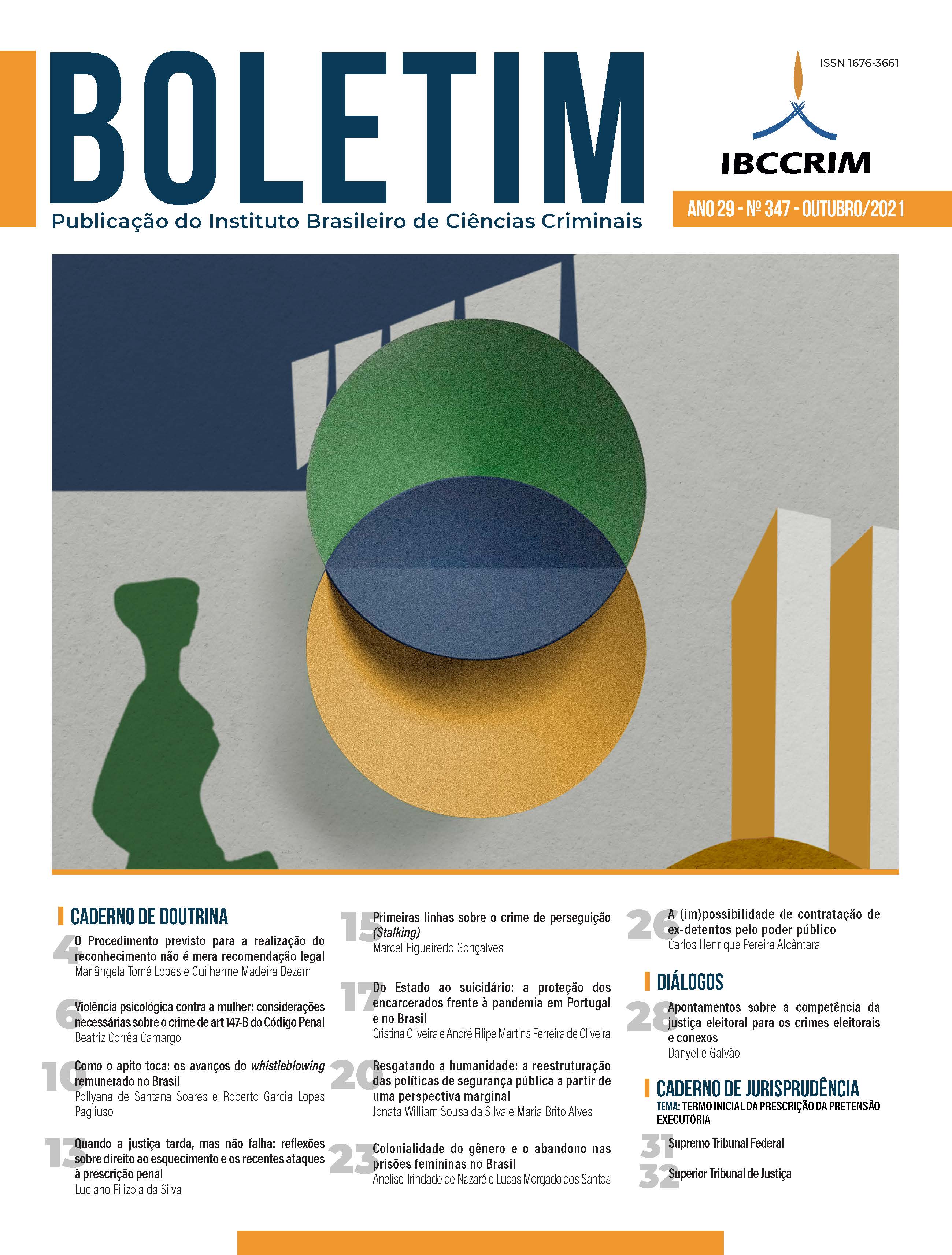When justice delays, but does not fail
reflections about right to oblivion and recent attacks on criminal prescription
Views: 70Keywords:
Right to Oblivion, Prescription, Dignity of the Human PersonAbstract
The present work aims to question the current attacks on the institute of criminal prescription according to the right to oblivion as a corollary of the dignity of the human person understood as a limiting instrument of the punitive power of the State. Through the analysis of recent jurisprudence, legislative changes and draft constitutional amendments, it is possible to demonstrate the political-criminal project of weakening the time constraints imposed and that have the function of ensuring that the individual does not have indefinitely the agency of the criminal system.
Downloads
Publication Facts
Reviewer profiles N/A
Author statements
- Academic society
- Instituto Brasileiro de Ciências Criminais
- Publisher
- IBCCRIM
References
BECCARIA, Cesare. Dos delitos e das penas. Trad. Torrieri Guimarães. São Paulo, Ed. Martin Claret, 2000.
BORDIEU, Pierre. O poder simbólico. Trad. Fernando Tomaz. 2 ed. Rio de Janeiro: Bertrand Brasil, 1998.
BRASIL. Código Penal. Vade Mecum Penal. Org. Lívia Céspedes e Fabiana Dias da Rocha. 4 ed. São Paulo, Saraiva educação, 2020.
BRASIL. Câmara dos Deputados. Projeto de Emenda Constitucional 75/2019. Disponível em: https://www.camara.leg.br/proposicoesWeb/fichadetramitacao?idProposicao=2229539
Acesso em: 06 de julho de 2021.
BRASIL. Câmara dos Deputados. Projeto de lei 5.686/2019. Disponível em: https://www.camara.leg.br/proposicoesWeb/fichadetramitacao?idProposicao=2227041
Acesso em: 06 de julho de 2021.
BRASIL. Decreto 678/1992. Promulgação da convenção americana sobre direitos humanos de 1969. Disponível em: http://www.planalto.gov.br/ccivil_03/decreto/d0678.htm
Acesso em: 06 de julho de 2021.
BRASIL. Supremo Tribunal Federal (1. Turma). Recurso Extraordinário nº 983.531/DF. Relator: Min. Roberto Barroso, 29 mar. 2017. Disponível em: http://www.stf.jus.br/portal/processo/verProcessoPeca.asp?id=311431341&tipoApp=.pdf
Acesso em: 14 maio de 2021.
BRASIL. Supremo Tribunal Federal. Recurso Extraordinário nº 1.010.606/RJ. Relator: Min. Dias Toffoli, 11 fev. 2021. Disponível em: http://portal.stf.jus.br/processos/detalhe.asp?incidente=5091603
Acesso em: 14 maio 2021.
BRUNO, Anibal. Direito Penal: parte geral. Tomo 3. São Paulo: Ed. Forense, 1967.
COELHO, Edihermes Marques. Prescrição penal como limite ao poder-dever punitivo estatal. Revista Jurídica UNICURITIBA, Curitiba, v. 03, n. 60, p. 339 – 360, jul./set. 2020.
CONSELHO DA JUSTIÇA FEDERAL. Enunciado 531 da VI Jornada de Direito Civil. Disponível em: https://www.cjf.jus.br/enunciados/enunciado/142.
Acesso em: 06 de julho de 2021.
OST, François. O tempo do Direito. Trad. Maria Fernanda Oliveira. Lisboa: Instituto Piaget, 1999.
RAIZMAN, Daniel. Manual de direito penal: parte geral. São Paulo: Saraiva educação, 2019.
ZAFFARONI, Eugênio R. E PIERANGELI, José H. Manual de direito penal brasileiro. Parte geral. 11. ed. São Paulo: Revista dos Tribunais, 2015.
Downloads
Published
How to Cite
Issue
Section
License
Copyright of published articles belongs to the author, but with journal rights over the first publication and respecting the one-year exclusivity period. Authors may only use the same results in other publications by clearly indicating this journal as the medium of the original publication. If there is no such indication, it will be considered a situation of self-plagiarism.
Therefore, the reproduction, total or partial, of the articles published here is subject to the express mention of the origin of its publication in this journal, citing the volume and number of this publication. For legal purposes, the source of the original publication must be consigned, in addition to the DOI link for cross-reference (if any).


 Português (Brasil)
Português (Brasil)
 English
English
 Español (España)
Español (España)




